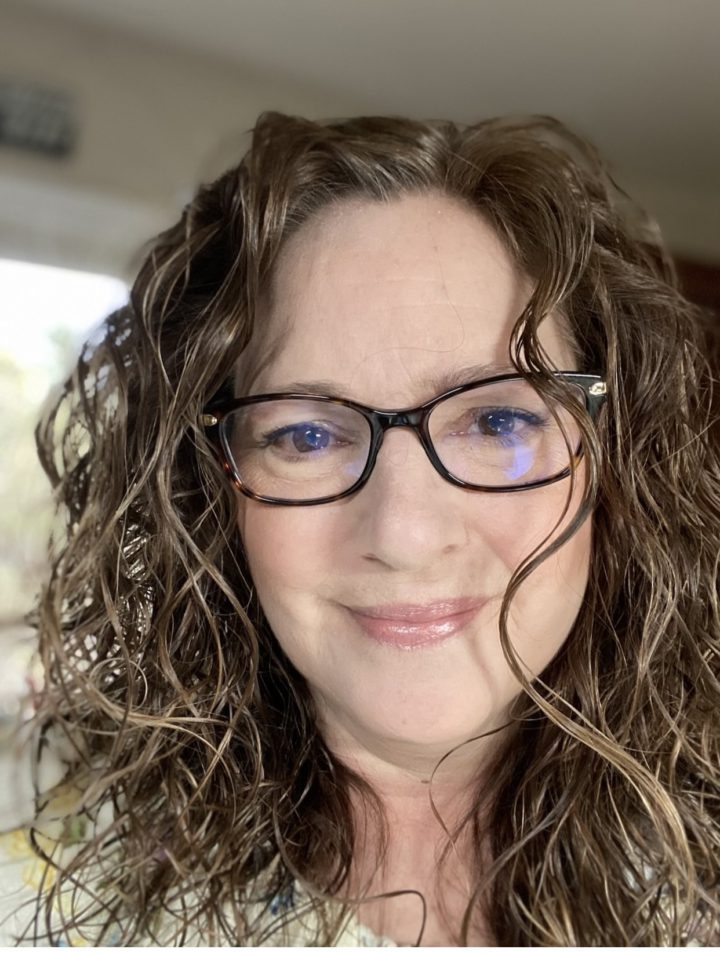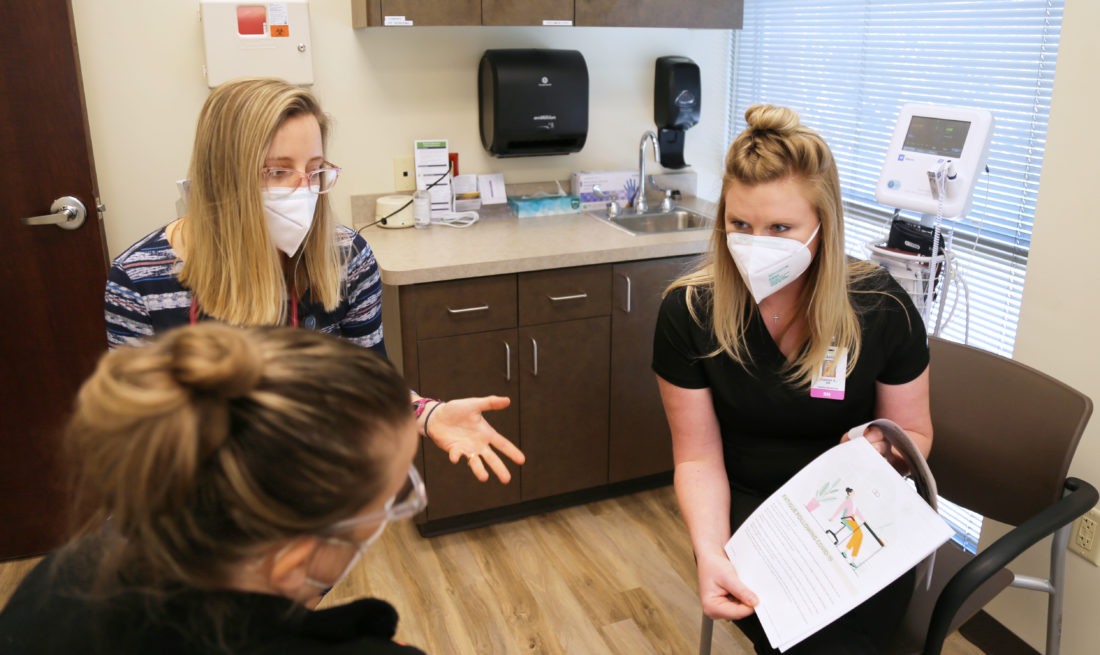It started with a fever that lasted almost a month.
“I had a fever and a sore throat and low oxygen and rapid heartbeat — just about every symptom except for cough,” remembers Asheville resident Katherine Cosimano.
That was in May 2020, relatively early in the pandemic, when testing for COVID-19 remained hard to come by. When her symptoms became worrisome, Cosimano went to the hospital, where she tested negative for the coronavirus. Doctors reassured her that the strange myriad of symptoms she was experiencing couldn’t be caused by the disease that was raging through the country.
But nearly a year later, Cosimano says, she is still experiencing many of the telltale signs of a COVID-19 infection.
“The most troubling symptom for me right now is my difficulty breathing. We have a dog and we live on the third floor, and I used to walk her regularly. And now when I walk her, I need to use my rescue inhaler and my nebulizer. Just walking anywhere is a big ordeal, ” says Cosimano, 58. “I also have a hard time with word retrieval, so in the middle of a sentence I can’t remember a perfectly common word like ‘table’ or ‘cup.’ It’s embarrassing.”
Cosimano is not alone: Tens of thousands of people in the United States experience lingering illness after a bout with COVID-19. The condition, called post-acute COVID-19, may impact up to 60% of people previously infected with the coronavirus. These COVID-19 “long-haulers” show persistent symptoms two months after the onset of the disease — even after tests no longer detect the virus in their bodies.
While those lingering effects can be bleak for patients, a newly opened clinic promises hope and support for Western North Carolina residents with long-haul COVID-19 symptoms. Spearheaded by Dr. Stephanie Call and nurse practitioner Keelan Dorn, the Post-Acute Covid-19 Care Clinic at the Mountain Area Health Education Center is the first of its kind in the region.
“It’s really about validating a person and helping them move forward,” says Call, who both serves as the clinic’s medical director and cares for its patients. “It’s a clinic to support people on their road to health and wellness and living with this syndrome that we’re learning about as we go.”
Sick and tired
While most people infected with the coronavirus recover within a few weeks, says Call, post-acute COVID-19 symptoms like shortness of breath, persistent cough and generalized fatigue can last for much longer. People may also experience neurological issues, dubbed “brain fog,” that can manifest as memory problems, confusion or even depression and anxiety.
Doctors and researchers worldwide are still seeking to understand the full impacts of the coronavirus on the body, Call explains. All of a patient’s physical and mental health issues must therefore be evaluated before long-haul COVID-19 can be ruled out.
“Honestly, people can present with almost any symptom, and we have to think through whether this could be potentially related to COVID,” she says. “COVID is just such a big inflammatory disease that your body takes such a hit with it. We don’t even understand why it causes some of the things that it does.”
Patients at the new clinic are assessed through a full medical examination that can take up to two hours, with most receiving chest X-rays, an echocardiogram to understand their heart condition, bloodwork and a six-minute walk test to look for low oxygen when exercising. Staff members give special attention to each patient’s specific concerns and symptoms.
“We’re listening to the patient’s story. We want to hear exactly what symptoms they’re concerned about, and then we do a check on all symptoms that might be associated with post-COVID,” Call explains.
Depending on those patient stories and test results, a range of experts, from cardiologists and pulmonary specialists to speech therapists and neurologists, are on hand to address the many issues that could be linked to the disease. “It’s really about an interprofessional partnership,” Call says. “That’s a really important component of this syndrome, just really approaching it from all angles.”
Healthy body, healthy mind
Mental health is also crucial to the wellness of long-haul COVID-19 patients, adds nurse practitioner Dorn. Although long-term illness can cause people to experience depression or anxiety, she explains, the lack of information about long-haul COVID-19 may also create confusion or lead patients to doubt their own experiences.
“We see patients who ask us, ‘Is this real?’” Dorn says. “I think providing them with this validation that yes, this is real — yes, it is taking a toll not only on your mental health, but your physical health as well — is really important.”
Call adds that the physical symptoms of the post-acute COVID-19, particularly shortness of breath, and severe fatigue and cough, can exacerbate pre-existing mental conditions.
“When you are short of breath, it just enhances your anxiety, which then makes you more short of breath. So it can create that terrible cycle,” she notes.
For those reasons, Dorn says that the clinic’s team also includes a behavioral health specialist who meets with patients and gauges their mental and emotional wellbeing during the initial assessment. “Their presence on that first appointment is absolutely vital,” she says.
Sweet relief

The clinic is open to new patients with a physician’s referral and expects to serve about a dozen people per day at full capacity. Dorn says she is hopeful that, as the pandemic in the U.S. reaches its final stages, the medical world’s focus will shift to post-acute COVID-19 management and care.
“I think there is a demand,” adds Call. “There are a lot of people in the community who have symptoms after COVID and just don’t know if it is anything serious. And for some of those patients, they feel like they’re alone or unsure.”
Cosimano, who has been experiencing COVID-like symptoms for nearly a year, was one of those people. She was referred to the new facility by her primary physician at MAHEC and became one of the clinic’s first patients.
After careful evaluation of her symptoms and medical history, Call and other specialists determined that the mysterious illness that Cosimano experienced last year likely was COVID-19 after all and developed a strategy for her to begin managing the condition.
For Cosimano, the care plan and validation of her illness brought what she calls a sigh of relief.
“For the first time in a year, I have some hope,” Cosimano says. “I know they’re not magic and there’s a lot we don’t know about COVID, but at least there’s hope now.”




I’m dealing with severe post covid neuropsychiatric disorder.. constant racing heart, pulsating burning at base of skull. Severe panic and anxiety reactions I have never experienced. Where can I go to get help? It’s too much for family as well as myself.
My nurse practitioner suggested I contact you. In last few months I have totally lost my sense of smell and some ability to taste. I have never had any Covid symptoms. I have had all my vaccines and booster. I have diligently worn a mask since the pandemic was discovered. Is there anything I can do , besides”wait and see”, to help me?
Thank you
Jo